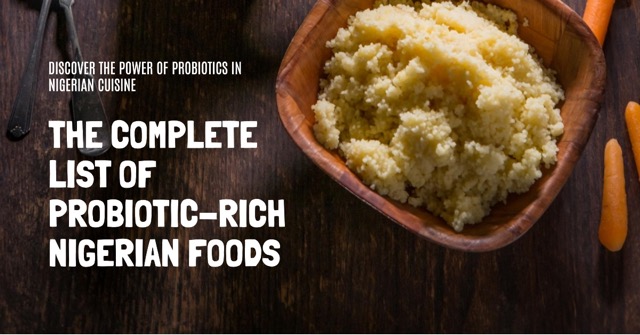Searching for Nigerian foods rich in probiotics?
Then I have 'gut' good news for you.
Because I have compiled the complete list for nigerian foods that are high in probiotics.
Let's get to the list straight away.

Nigerian Probiotic-Rich Foods List
Here are 16 Foods you can find in Nigeria that are rich in probiotic:
1. Pap (Ogi/Akamu)
Pap is a fermented porridge made from corn or millet. To make pap, the grains are soaked in water for 1-3 days which allows natural fermentation by lactic acid bacteria. This gives pap its sour taste and probiotic benefits.
Pap is one of the most common probiotic foods in Nigeria. It provides:
- Digestive health benefits
- Vitamins like folate, thiamin, and riboflavin
- Minerals like calcium, iron, and zinc
Pap is affordable, readily available, and easy to prepare. It can be eaten alone or served with bean paste, smoked fish, and more.
"Pap is an excellent source of probiotics. As a beloved breakfast food, it's an easy way to start your day with a dose of beneficial bacteria."
2. Fufu
Fufu is a staple food across West Africa made from fermented cassava. Traditional preparation involves soaking cassava in water for several days. The fermentation process reduces its cyanide content and increases the bioavailability of nutrients like protein, iron, and zinc.
Fufu can be made into balls or spoon-sized swallows. It has a smooth doughy texture and sour taste from lactic acid bacteria. Fufu provides probiotics that support:
- Digestive regularity
- A healthy gut microbiome
- Immune function
3. Garri
Garri is another probiotic-rich fermented cassava food. To make garri, cassava goes through fermentation and then drying/frying which gives it a crispy granular texture. The longer the fermentation, the higher the probiotic levels in garri.
This versatile ingredient can be soaked in water, added to stews, or sprinkled on top of dishes. Garri supplies probiotics that:
- Improve nutrient absorption
- Support gastrointestinal health
Nigeria has several traditional fermented grain beverages that provide probiotic benefits. These drinks are made from nutritious ingredients like millet and sorghum. The fermentation process increases their nutritional profile and supplies a wide range of gut-friendly microorganisms.
4. Kunu
Kunu is a popular fermented millet drink from northern Nigeria. It has a sweet-sour taste and creamy texture.
To make kunu:
- Millet is soaked, germinated and boiled
- Natural fermentation occurs
- The process breaks down starch into sugars
- Probiotics feed on the sugars
Kunu contains probiotics that:
- Improve digestion
- Boost immunity
- Increase nutrient absorption
It also provides:
- Amino acids
- Minerals like magnesium, calcium, and iron
- B vitamins
"Kunu is a delicious traditional drink that provides hydration along with a dose of gut-boosting probiotics."
5. Pito
Pito is a traditional fermented beer made from sorghum or millet. It originated in Ghana and Nigeria.
Pito is made by:
- Malting the grains
- Mashings and fermenting with wild yeast
The fermentation gives pito its:
- Sour, tangy flavor
- Probiotic content
Pito probiotics support:
- Cholesterol levels
- Blood pressure
- Blood sugar
Pito also contains:
- Amino acids
- Vitamins and minerals
6. Burukutu
Burukutu is a Nigerian probiotic beer made from sorghum and/or millet.
To brew burukutu:
- Grains are germinated
- Dried and ground
- Then naturally fermented
Burukutu provides:
- Digestive probiotics
- Immune-boosting probiotics
It also supplies:
- Protein
- Amino acids
- Vitamins and minerals
These traditional fermented beers offer great flavor along with abundant probiotics and nutrients. They are time-honored drinks valued by generations of Nigerians.
In addition to grains, many traditional Nigerian foods are made from fermented legumes like beans, seeds, and nuts. Fermenting these plant proteins boosts their nutritional content and supplies probiotics. Some examples include:
7. Dawadawa
Dawadawa is a condiment made from fermented African locust beans. It is also known as iru.
To make dawadawa:
- Locust beans are boiled
- The seeds are fermented with bacteria
- This process reduces toxicity and increases protein digestibility
Dawadawa contains probiotics that:
- Strengthen the immune system
- Improve gastrointestinal health
- Support nutrient absorption
It also provides:
- Protein
- Vitamin B6
- Iron, magnesium, and calcium
Dawadawa is added to soups and stews for flavor. It serves as a nutritious probiotic-rich seasoning.
"Dawadawa is an important provider of protein and probiotics in Nigerian cuisine."
8. Ugba
Ugba is made by fermenting African oil bean seeds. It is also called ukpaka.
To make ugba:
- Oil bean seeds are boiled and peeled
- The peeled seeds are fermented
- Fermentation helps remove toxins
Ugba contains probiotics that:
- Aid digestion
- Improve gut health
It also supplies:
- Protein
- Fiber
- Vitamin C
- Calcium, iron, and magnesium
Ugba can be eaten as a snack or added to traditional dishes for its nutritional benefits.
9. African Locust Beans (Iru)
Iru are African locust beans that are fermented to make the condiment dawadawa described above.
Iru beans provide:
- Protein
- Fiber
- Vitamins and minerals
Fermenting these versatile beans increases their bioavailability and probiotic content. Iru is an important provider of nutrients across West Africa.
Fermented dairy products like yogurt, cheese, and raw milk are excellent sources of probiotics. Traditional Nigerian dairy foods made from cow, goat, or sheep milk also provide a boost of beneficial bacteria.
10. Yogurt
Yogurt is made by fermenting milk with live cultures. This gives yogurt its probiotic content (1).
Nigerian yogurt is traditionally made from:
- Cow milk
- Goat milk
- Sheep milk
Probiotics in yogurt provide:
- Digestive benefits(2, 3, 3).
- Immune boosting effects
- Increased absorption of nutrients like calcium and B12
When buying yogurt, look for:
- Live and active cultures
- Organic and grass-fed varieties
"Yogurt made from quality Nigerian dairy is teeming with probiotics that support overall health."
11. Raw Milk
Raw milk from cows, sheep, and goats is high in probiotics.
Pasteurization kills probiotics so raw milk provides:
- A wide variety of beneficial bacteria
- Enzymes to help digestion
- Immune-strengthening proteins like immunoglobulins
Drink raw milk plain or use it to make:
- Yogurt
- Cheese
- Other fermented foods
12. Aged Cheeses
Aged cheeses like cheddar and cottage cheese contain probiotic cultures (4, 5).
The aging process:
- Creates complex flavors
- Allows probiotics to develop
Look for raw milk cheeses at local markets or make them at home.
Nigerian aged cheeses provide:
- A delicious source of probiotics
- Protein, calcium, B12, phosphorus(6).
Fermented dairy is a traditional way to consume more probiotics and nutrients essential for Nigerian cuisine and health.
In addition to grains, beans, and dairy, there are other probiotic-rich fermented foods found in Nigeria such as:
13. Palm Wine
Palm wine is made from the fermented sap of various palm trees.
To make palm wine:
- Palm sap is collected
- Yeasts and bacteria ferment the sap
- Fermentation produces alcohol
Palm wine contains:
- Wild probiotics
- Vitamins like riboflavin and vitamin C
It provides health benefits such as:
- Lowering blood pressure
- Increasing HDL cholesterol
- Preventing strokes and heart disease
14. Unripe Plantains
Unripe plantains contain:
- Resistant starch - feeds probiotics
- Inulin - probiotic soluble fiber
Ripe plantains have less starch and fewer probiotics. Enjoy unripe plantain:
- Roasted
- Boiled
- Fried into chips
"Unripe plantains offer a delicious way to increase your probiotic intake."
15. Apple Cider Vinegar
Apple cider vinegar is made through fermentation. This provides:
- Probiotics
- Acetic acid - supports digestion
Apple cider vinegar may:
- Improve gut health
- Boost immunity
- Enhance glycemic control
Use it to make:
- Salad dressings
- Marinades
- Tonics
16. Fermented Teas
Kombucha is a fizzy probiotic tea.
Other fermented teas like jun provide:
- A variety of probiotic cultures
- Polyphenols and antioxidants
Sip these teas for benefits like:
- Increased energy
- Immune support
- Detoxification
What are probiotics & why are they important
Probiotics are live microorganisms that provide health benefits when consumed(7). They are usually called "good bacteria" or "helpful bacteria". Some common probiotics include lactobacillus and bifidobacterium.
Probiotics have many proven health benefits (8, 9, 10, 11):
- Improved digestion - Probiotics can help with digestive issues like bloating, gas, diarrhea, and constipation. They help balance gut bacteria.
- Immunity boost - Probiotics support immune health by increasing the production of antibodies and boosting levels of immune cells like lymphocytes.
- Skin health - Studies show probiotics can improve skin issues like acne, rosacea, and eczema by reducing inflammation.
- Mental health - Probiotics may reduce anxiety, depression, and obsessive thoughts. They help produce serotonin and other mood-regulating chemicals.
- Heart health - Probiotics lower LDL cholesterol and blood pressure levels. They may reduce the risk of heart disease.
- Weight loss - Probiotics support weight loss and maintenance by optimizing gut bacteria linked to obesity.
"Probiotics are live microorganisms which, when administered in adequate amounts, confer a health benefit on the host." - The United Nations and World Health Organization
This article will provide a comprehensive list of probiotic-rich foods commonly found in Nigeria. The top probiotic foods in Nigeria come from fermented grains, beans, dairy, and other ingredients.
Here is an overview of some common probiotic Nigerian foods:
| Food Type | Examples |
|---|---|
| Fermented Grains | Pap, fufu, garri, kunu |
| Fermented Beans | Dawadawa, ugba, iru |
| Fermented Dairy | Yogurt, raw milk, cheese |
| Other Fermented Foods | Palm wine, plantains, teas |
Including more probiotic foods in your diet can provide powerful benefits for your health and wellbeing. The naturally occurring "good bacteria" support your microbiome, immune system, digestion, weight, and more!
This article will explore Nigerian probiotic foods in detail, explaining how each food is prepared through fermentation to boost its live culture content. We'll also look at key health benefits, nutritional profile, and how to incorporate more of these traditional foods into everyday meals.
Conclusion on Nigerian Foods Rich In Probiotics
Traditional Nigerian cuisine includes a diverse array of fermented foods and drinks that provide probiotic benefits. Consuming more of these foods can improve several aspects of health.
Probiotics offer advantages like:
- Enhanced digestion
- Increased nutrient absorption
- Immune system support
- Lower cholesterol
- Improved heart health
- Healthier skin
- Reduced anxiety and depression
- Weight management
Probiotic Nigerian foods include:
Grains:
- Pap
- Fufu
- Garri
- Beer like burukutu
Beans:
- Dawadawa
- Ugba
- Locust beans
Dairy:
- Yogurt
- Cheese
- Raw milk
Other:
- Palm wine
- Fermented teas
- Apple cider vinegar
"Traditional Nigerian foods are naturally rich in live probiotics that benefit the body in numerous ways."
To boost your probiotic intake:
- Try new fermented foods
- Make yogurt, kefir, or kombucha
- Look for raw, unpasteurized foods
- Opt for organic when possible
- Check labels for live cultures
A diet containing more fermented Nigerian staples provides the friendly bacteria your body needs along with essential vitamins, minerals, and nutrients.
Support your microbiome and overall health by exploring probiotic-rich traditional foods. Include fermented pap, garri, dawadawa, yogurt, and more in your everyday Nigerian dishes.
